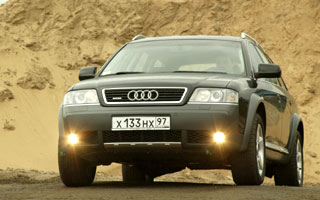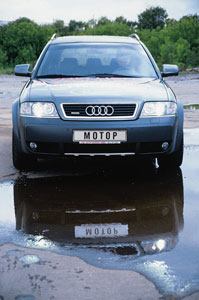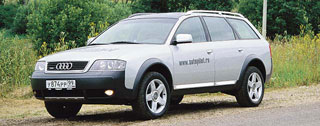Audi Allroad 2000 test drive - 2006 SUV
Universals of sandy quarries
Do you like assertive and dynamic driving style? Do you think that fate is different, would have become a good race car driver? At the same time, do you confess an active lifestyle-tents-bears-ski tents, at worst, barbecue in nature? The courageous style is not alien to you? And choose a car for yourself - so that all together and in one bottle ... A soft light is not like a laundry, not every asphalt will overcome. And a massive all -around only scares with its appearance of others - you will not be able to feel all the subtleties of piloting on it.Between the station wagon and the all -around
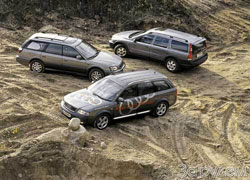 However, there is the right car - this is a station wagon of increased cross -country ability. Its recipe is quite simple: to take an ordinary passenger universal with all -wheel drive and the engine is more powerful; change the gear ratio of transmission; If possible, add locks, or even lowering the gear in the handout; Enlighten the road clearance to a reasonable limit; For the sake of recognizability, lining around the perimeter with a protective plastic belt, allegedly by chance releasing the edges of a powerful metal protection from under the bumper; The composition is to crown religions on the roof and give this miracle on large toothy wheels. Of course, it is not worth confusing such a car with a real all -terrain vehicle, but it will almost not give in to the SUV in terms of patency, and any passenger car will give a hundred points forward, while retaining almost all its best qualities on the highway. Such an all -wheel drive is more than the others, the current abbreviation SUV - Sport Utility Vehicle, that is, a sports and practical car, is more suitable. Righting on the second word, it will prefer it simply pragmatists without ambitions. These do not expect mercies from nature, weather and road workers, but the classic all -terrain vehicle is too thundering for them.
However, there is the right car - this is a station wagon of increased cross -country ability. Its recipe is quite simple: to take an ordinary passenger universal with all -wheel drive and the engine is more powerful; change the gear ratio of transmission; If possible, add locks, or even lowering the gear in the handout; Enlighten the road clearance to a reasonable limit; For the sake of recognizability, lining around the perimeter with a protective plastic belt, allegedly by chance releasing the edges of a powerful metal protection from under the bumper; The composition is to crown religions on the roof and give this miracle on large toothy wheels. Of course, it is not worth confusing such a car with a real all -terrain vehicle, but it will almost not give in to the SUV in terms of patency, and any passenger car will give a hundred points forward, while retaining almost all its best qualities on the highway. Such an all -wheel drive is more than the others, the current abbreviation SUV - Sport Utility Vehicle, that is, a sports and practical car, is more suitable. Righting on the second word, it will prefer it simply pragmatists without ambitions. These do not expect mercies from nature, weather and road workers, but the classic all -terrain vehicle is too thundering for them.  There are not so many cars built according to such a scheme - automakers have just felt the prospect of the class and began to master it. Let's get acquainted with his representatives closer:
There are not so many cars built according to such a scheme - automakers have just felt the prospect of the class and began to master it. Let's get acquainted with his representatives closer: Subaru Legacy Outback/›Subaru Legashi Outbek - 2.5 liters, cost - $ 36.1 thousand; Volvo V70xc AWD Cross Country - 2, 4 l, $ 44.7 thousand; Audi -canron - 2.7 liters, $ 55.3 thousand.
All three samples in fairly rich trim levels are equipped with automatic machines.
National features
 The cars are easily guessed by their creators. Subaru, as befits the Asian, is the most compact, its width is 110-120 mm less than that of colleagues-rivals. Non -frame door glass looks very stylish - and, after all, surprisingly, they do not let water in the rain and do not whistle at speed! But partly precisely because of this decision, the C-stroke* prettyly pursed the rear doorway.
The cars are easily guessed by their creators. Subaru, as befits the Asian, is the most compact, its width is 110-120 mm less than that of colleagues-rivals. Non -frame door glass looks very stylish - and, after all, surprisingly, they do not let water in the rain and do not whistle at speed! But partly precisely because of this decision, the C-stroke* prettyly pursed the rear doorway. The adjustments ranges are also clearly designed not for basketball players - the driver 180 cm tall lifts the steering wheel almost to the stop (unlike other machines, the column length is not adjusted here) and pushes the chair away and down. The back there remains exactly as much space as it is necessary for proper landing, when the back is fully pressed to the back - you can’t rest with your knees, but it will not work slightly down and relax. The third one is there, then it is better than a teenager. (It is no coincidence that a trough -like stamping is made in the roof - only about 40 mm are gaining over her head.) Large external mirrors are very good - they almost do not leave dead zones.
 The salon is rather the brainchild of a technologist than a designer: made very soundly and carefully, but without delights. I got out of the car, soon you will not remember how it looks inside. Front chairs are comfortable, gently fixing the body during lateral overloads. The headrests, on the contrary, as if a fist of a fist aimed at the back of the head - are probably functional during an accident, but they do not pull to lie down. Probably, due to unification with machines for the domestic market, the handbrake was on the right side of the tunnel - at the passenger. And the lack of locking the automatic transmission selector, when the ignition key is not inserted or the brake pedal is not pressed, for a car of this class today a puncture today. Age, age ...
The salon is rather the brainchild of a technologist than a designer: made very soundly and carefully, but without delights. I got out of the car, soon you will not remember how it looks inside. Front chairs are comfortable, gently fixing the body during lateral overloads. The headrests, on the contrary, as if a fist of a fist aimed at the back of the head - are probably functional during an accident, but they do not pull to lie down. Probably, due to unification with machines for the domestic market, the handbrake was on the right side of the tunnel - at the passenger. And the lack of locking the automatic transmission selector, when the ignition key is not inserted or the brake pedal is not pressed, for a car of this class today a puncture today. Age, age ... As befits a descendant of the Vikings, Volvo looks tall and rude. And look in front - the width seems just huge! However, why it seems: five cylinders are in a row and an automatic machine - so 1611 mm ruts, much more. And what is this miracle? Massive doors fixers are so powerful and warning that they themselves slam them behind the passenger - to have time to jump into the salon until his legs pinched. No, thanks ...
 In the salon, Volvo I fell into childhood - and I assure that most people will feel like a Country cross, as if in a giant cave. It's not even in size, although five well -fed men will easily fit here. It’s just that many elements of the interior are unusually large -forming and deliberately simplified, as if displaced with a pair of blows from a block: if the central console is flat as a wall, and a quarter of a square meter, if a button is at least three fingers, and if a line on a leather seat, then, then each stitch is a couple of centimeters. Spacious! And the inner mirror is matching - it opens the panorama no worse than the windshield, compensating for the stinginess of the miniature external petals.
In the salon, Volvo I fell into childhood - and I assure that most people will feel like a Country cross, as if in a giant cave. It's not even in size, although five well -fed men will easily fit here. It’s just that many elements of the interior are unusually large -forming and deliberately simplified, as if displaced with a pair of blows from a block: if the central console is flat as a wall, and a quarter of a square meter, if a button is at least three fingers, and if a line on a leather seat, then, then each stitch is a couple of centimeters. Spacious! And the inner mirror is matching - it opens the panorama no worse than the windshield, compensating for the stinginess of the miniature external petals. 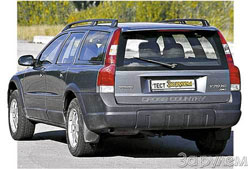 But the anthropometric indicators of the giant are tied to wise: only in the lower position of the seat, the raised steering wheel does not overlap the devices to the driver only 180 cm tall, but not at all a giant boot of the 43rd size barely squeezed to the accelerator between the brake pedal and the central tunnel. By the way, about the legs: it is difficult to find a reliable support for the left foot - the platform for it looks like a washcloth hidden under a rug, the same soft and shapeless. Adjusting the seat in height, as if in a cheap low -profile - pulling the handle, you need to jump into the seat so that the spring supplies it up. The lever of the machine gun is good, but you are involuntarily careful with the handbrake - it is painfully flimsy in appearance. However, there is nothing more to complain about - everything else is convenient and functional - for example, electric heating of the lower edge of the glass (in brushes), ventilation deflectors in medium racks. Such a intelligible ventilation and heating remote must still be looked for, and flashlights hung up in external mirrors facilitate the landing and leaps in the dark.
But the anthropometric indicators of the giant are tied to wise: only in the lower position of the seat, the raised steering wheel does not overlap the devices to the driver only 180 cm tall, but not at all a giant boot of the 43rd size barely squeezed to the accelerator between the brake pedal and the central tunnel. By the way, about the legs: it is difficult to find a reliable support for the left foot - the platform for it looks like a washcloth hidden under a rug, the same soft and shapeless. Adjusting the seat in height, as if in a cheap low -profile - pulling the handle, you need to jump into the seat so that the spring supplies it up. The lever of the machine gun is good, but you are involuntarily careful with the handbrake - it is painfully flimsy in appearance. However, there is nothing more to complain about - everything else is convenient and functional - for example, electric heating of the lower edge of the glass (in brushes), ventilation deflectors in medium racks. Such a intelligible ventilation and heating remote must still be looked for, and flashlights hung up in external mirrors facilitate the landing and leaps in the dark.  Audi won the traditional for the Germans with the accuracy of fitting body panels and the brilliance of polished metal: moldings, nameplate, overlays - there is something to catch on the eye. It is immediately visible - a thoroughbred and expensive little thing. However, this is the surroundings, but what about it? A very convenient and practical car: large doorways, just a huge interior - even sitting behind a two -meter giant, you can throw your foot on your leg; high quality interior decoration, thought out to the smallest detail; The richest equipment. Not to mention xenon headlights, an expensive audio system or parking sensors, for example, there is a heating of all five seats, extending curtains on the rear windows. What is there - leaning handles on the ceiling and even clothes for clothes are equipped with microlyffs! In general, almost limousine, adapted for bad roads.
Audi won the traditional for the Germans with the accuracy of fitting body panels and the brilliance of polished metal: moldings, nameplate, overlays - there is something to catch on the eye. It is immediately visible - a thoroughbred and expensive little thing. However, this is the surroundings, but what about it? A very convenient and practical car: large doorways, just a huge interior - even sitting behind a two -meter giant, you can throw your foot on your leg; high quality interior decoration, thought out to the smallest detail; The richest equipment. Not to mention xenon headlights, an expensive audio system or parking sensors, for example, there is a heating of all five seats, extending curtains on the rear windows. What is there - leaning handles on the ceiling and even clothes for clothes are equipped with microlyffs! In general, almost limousine, adapted for bad roads. Flaws? There are, although in addition to the high price, others are not so easy to find. For example, the massive front panel slightly crowns the passenger’s legs. The dashboard, it seems, was first painted by the designer, and then some scales were inserted into the pretty circles - do the oil temperature indicator, in addition to the indicator of the coolant temperature, and the voltmeter? Yes, and with a speedometer they overdoed it: its non -linear scale, moreover, with different -caliber numbers, is difficult to perceive.
For inventory and cargo
 What about tents and skis? For them, there will be a place in any of the cars: each under a soft extending curtain - a hold of a volume almost in a half -off. Differences of several centimeters in length-shirin are insignificant. At Subaru, the opening of the fifth door is slightly narrowed down, the Audi has a stronger wheel arches, Volvo is deprived of these shortcomings, in addition it has an almost vertical door - it is convenient for a large -sized cargo. Under the ceiling of the Swede, a lowered metal grille to protect passengers, and the German has a strong network stretched from behind.
What about tents and skis? For them, there will be a place in any of the cars: each under a soft extending curtain - a hold of a volume almost in a half -off. Differences of several centimeters in length-shirin are insignificant. At Subaru, the opening of the fifth door is slightly narrowed down, the Audi has a stronger wheel arches, Volvo is deprived of these shortcomings, in addition it has an almost vertical door - it is convenient for a large -sized cargo. Under the ceiling of the Swede, a lowered metal grille to protect passengers, and the German has a strong network stretched from behind. The differences in the transportation of long -meters are more noticeable. Subaru offers a standard set - cut, in a 40/60 proportion, folding backs and a rear seat pillow. The rear sofa Volvo is divided into three autonomous parts in a ratio of 40/20/40 - combine as you want, and you can even remove the interfering segments of the pillow, lengthening the compartment. Audi offers only a back divided in the usual proportion, which, being thrown back on a fixed pillow, does not want to form an even platform. If the transformation is partial, then the roll with a net sticks in the middle, like a barrier, because it is fixed on one of the halves of the back.
Ralist, cruiser and ring
 Before rushing into the pampas, let's see how our trinity behaves on the asphalt.
Before rushing into the pampas, let's see how our trinity behaves on the asphalt. The strongest impression of Subaru outbar is an incomparable sound of the operation of the opposition motor: in forced modes, it goes into a juicy roar with a characteristic cutting. Of course, it is difficult to compete at an atmospheric opposition with much more powerful turbocharger engines - hot lovers will prefer a three -liter six. On the other hand, the average fuel consumption of Subaru is easily laid in 10 l/100 km - the pair has significantly larger. What conquers Subaru - the honing of reactions to the actions of the steering wheel and an excellent feedback (they see, see, rally roots). The car is so obedient and well balanced that it seems that it costs nothing, putting it sideways, go through a turn in the style of Tommy Myakinen. And you perceive some noisy no noisy as a flaw, but as a sign of sports. At the same time, there is no hint of a tooth -free shaking - the outback carries passengers smoothly and carefully. True, a mechanical gearbox is more suitable for the highest aerobatics - a slow automatic forces to get nervous even with ordinary overtaking. In addition, ABS is roughly triggered.
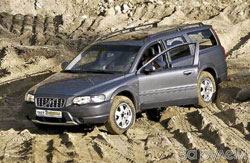 The Volvo-Cross Country character turned out to be American. A large car is very good when parking - the steering wheel is very light. However, having passed some critical situation in the maneuver, he independently runs to the stop - this is already dangerous. At higher speeds, tightening into the turn disappears, but completely empty control deprives the feedback driver. In addition, there is little damping - the released steering wheel does not return smoothly to a neutral position, straightening the trajectory of the machine, but makes several fluctuations, forcing the car to write out the snake.
The Volvo-Cross Country character turned out to be American. A large car is very good when parking - the steering wheel is very light. However, having passed some critical situation in the maneuver, he independently runs to the stop - this is already dangerous. At higher speeds, tightening into the turn disappears, but completely empty control deprives the feedback driver. In addition, there is little damping - the released steering wheel does not return smoothly to a neutral position, straightening the trajectory of the machine, but makes several fluctuations, forcing the car to write out the snake. The engine is traction - it gives out the maximum of torque in a wide range from 1800 to 5000 rpm. There is no hint of turboyama (failure of traction in the low -speed zone). The adaptive machine switches smoothly, however, in manual control mode, they need to work with a lead - delays are noticeable. In Volvo, this mode is most similar to the work of a conventional mechanical box - the transfers are rigidly fixed and there is no switching either down in Kikdown or up - when the maximum revolutions are reached. A case of rare modesty - Country Cross exceeded the maximum speed of 200 km/h declared by the manufacturer! The car turned out to be very quiet - what are one
 and two -layer side glass. Through them, only the rattle of the rubber teeth of the Scorpions - Shin Pirelli breaks through, and even from the side it is heard by a mile away. Silence and lulling swaying at speed extinguish sports ambitions. It is for the better - the brakes are quite powerful, but prone to overheating: after several intense slowdown, their effectiveness falls.
and two -layer side glass. Through them, only the rattle of the rubber teeth of the Scorpions - Shin Pirelli breaks through, and even from the side it is heard by a mile away. Silence and lulling swaying at speed extinguish sports ambitions. It is for the better - the brakes are quite powerful, but prone to overheating: after several intense slowdown, their effectiveness falls. Two and a half hundred horses Audi -adhesis speak for themselves - gun! And large caliber. A feeling of massive solidity is created by a suspension that holds the body from swing on irregularities. The rolls in the corners are minimal, and the reactions are quite sharp. Such a combination, and even successfully attached to the transmission, a hard hydrrotransformer create a feeling of a ring machine rather, and not a rally, as, say, Subaru. On it I want to not revenge with the tail in corners, but to prescribe them extremely accurately, as much as possible using the power of the engine, brakes and excellent clutch properties of the pyrelli p6 shin. With the speed of speed, the pneumatic suspension automatically lowers the body of the Audi lower, at moderate speeds the clearance is restored. However, with a road clearance you can manually be controlled, but it is more important there ...
... where the roads end
 So we got to the sand career - this is perhaps that limit of impassability, which is unreasonable to step over these machines.
So we got to the sand career - this is perhaps that limit of impassability, which is unreasonable to step over these machines. Subaru Outbek does not show the slightest tendency to axle due to the fair distribution of traction - the symmetrical interdosseous differential divides the torque in the proportion of 50/50, and in the case of slipping the wheels of one of the axes is blocked by VISKOUTTA. Another WISKOUT - the rear differential. However, the combination of elegant painted bumpers and long overhangs (the angles of the entrance and travel - the smallest - only 18) makes you be careful on bumps. The suspension elements are massive and durable, the distance to the bottom is large, the most vulnerable to the release. The lumen to it is 180 mm, but it almost does not depend on the load, thanks to the rear self-healing shock absorbers Self-Levelizer.
 With the corners of the Volvo-Cross Country, a complete order, and scratches on unpainted bumers are almost invisible, although it is not easy to wash the rough plastic from the stuck dirt. The situation is slightly worse: the same 180 mm and also under the release of the rear axle, but only on the empty machine - the level of maintenance of the level is supplied for a fee. But only Volvo in front is not some kind of plastic protection against spray, but a four-millimeter aluminum slab! Thanks to the tires with developed primerials, the machine costs only a front -wheel drive for a long time - in the absence of slipping, almost the entire torque is transmitted to the front wheels. The rear bridge is connected by a viscous coupling with a certain delay, when the front wheels are already striving to smile into the sand. In addition, there is a Tracs anti -wings device that plays the role of electronic blocking of inter -axle differentials.
With the corners of the Volvo-Cross Country, a complete order, and scratches on unpainted bumers are almost invisible, although it is not easy to wash the rough plastic from the stuck dirt. The situation is slightly worse: the same 180 mm and also under the release of the rear axle, but only on the empty machine - the level of maintenance of the level is supplied for a fee. But only Volvo in front is not some kind of plastic protection against spray, but a four-millimeter aluminum slab! Thanks to the tires with developed primerials, the machine costs only a front -wheel drive for a long time - in the absence of slipping, almost the entire torque is transmitted to the front wheels. The rear bridge is connected by a viscous coupling with a certain delay, when the front wheels are already striving to smile into the sand. In addition, there is a Tracs anti -wings device that plays the role of electronic blocking of inter -axle differentials. 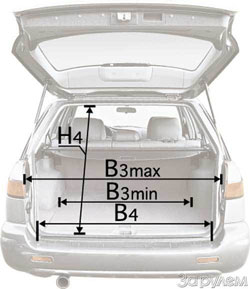 The toothless tires of Audi-allwood does not threaten to seduce, but their adhesion properties on the ground are low. On a good road, the torque is divided equally between the front and rear axle, and in the case of slipping, the distribution of traction adjusts the center differential of increased friction of the torsen. EDS electronic lock helps him, braking the masking wheel. The main trump card of Ollroud is the possibility of changing road clearance. In the upper top of the four provisions, 195 mm is typed under the engine compartment, and in the remaining places it is 220-230 mm at all. By the way, peeping in front and behind the edges of a powerful protection is a spectacular props: these are just thin metal overlays on the bumper! Another advantage is a strong and hard body, which during diagonal hanging, unlike a couple of other machines, is not completely overwhelmed, which allows you to close the doors just as easily.
The toothless tires of Audi-allwood does not threaten to seduce, but their adhesion properties on the ground are low. On a good road, the torque is divided equally between the front and rear axle, and in the case of slipping, the distribution of traction adjusts the center differential of increased friction of the torsen. EDS electronic lock helps him, braking the masking wheel. The main trump card of Ollroud is the possibility of changing road clearance. In the upper top of the four provisions, 195 mm is typed under the engine compartment, and in the remaining places it is 220-230 mm at all. By the way, peeping in front and behind the edges of a powerful protection is a spectacular props: these are just thin metal overlays on the bumper! Another advantage is a strong and hard body, which during diagonal hanging, unlike a couple of other machines, is not completely overwhelmed, which allows you to close the doors just as easily. Subaru Legashi made his debut in 1989, nine years later his appearance was updated. A sedan or station wagon is produced with bodies, the drive is front or complete. Outbek appeared in 1997 (in some Lancaster markets) formally - an independent model, in fact - an all -wheel drive station wagon, adapted for bad roads. Branded line - opposite gasoline engines with a volume of 2.0 (varying degrees of force); 2.5 or 3.0 liters. The gearboxes are five -speed mechanical (except 3.0 l) or four -speed automatic.
+Reasonable price, informative steering wheel, accurate reactions on the road, the juicy sound of the engine.
-Detable operation of the machine, large overhangs, modest sizes of the salon.
In the line -up, Volvo is the first to be the first to update not sedans, but extremely popular station wagons. For example, only the V70 station wagon, using a shortened Sedan Sedan platform, was replaced by the 70th series of the 1996 model in 2000. A little later, a all -resistant modification of the Volvo V70XC Cross Country was presented. Unlike the usual V70, which is produced with a fairly wide range of engines, both in the front and in all-wheel drive modifications, Country crosses are equipped only with all-wheel drive and 2.4 liters. Boxes are five -speed - mechanical or automatic.
+Good sound insulation, spacious interior, high level of comfort, an abundance of trunk transformation options.
-Nomative steering wheel, prone to overheating of the brake.
In 1997, the Audi A6 front -wheel drive sedan debuted. Then, with an interval of Avan, A6 Croatro, A6 Croatro, with an all -wheel drive transmission and, finally, Audi -Hall, - an all -terrain modification of an all -wheel drive station wagon. OLRUD is equipped only with the most powerful engines - 2.7 liters or 2.5 liters of gasoline, aggregated with a six -speed mechanical or five -speed automatic gearbox.
Clear behavior on the road, high smoothness, powerful engine, effective brakes, rich equipment, a very spacious salon, adjustable clearance.
High price, non -optimal configuration of the dashboard.
SUMMARY
 Each car costs its money: if Subaru Legacy Outback/›Subaru Legashi Outbek is a provoking, almost rally car, combed for public roads, Volvo -Cross Country - a comfortable liner for distant warriors with family and a bunch of equipment, then audi -allryudes are an athletic gentleman.
Each car costs its money: if Subaru Legacy Outback/›Subaru Legashi Outbek is a provoking, almost rally car, combed for public roads, Volvo -Cross Country - a comfortable liner for distant warriors with family and a bunch of equipment, then audi -allryudes are an athletic gentleman. There are two transparent hatches in the roof of Outbek - lifting and sliding.
Under the intricacies of pipelines, a proprietary opposition four is hidden.
Fire door glass is a characteristic feature of most Subaru cars.
The stepped slot makes you control the movement of the selector with a gaze - it is difficult to do this to the touch.
The rear seat is divided into three parts in the proportion of 40/20/40, to protect passengers from above, the grate is lowered.
For rear passengers - special deflectors in racks.
Volvo V70xc AWD Cross Country
The central console is flat and huge, like a wall.
A simpler and more understandable ventilation control panel is difficult to come up with.
A rare layout solution - the in -line five is located across.



Text / Yuri Nechetov
Photo / Alexander Polunin
Source: The magazine "Driving"






